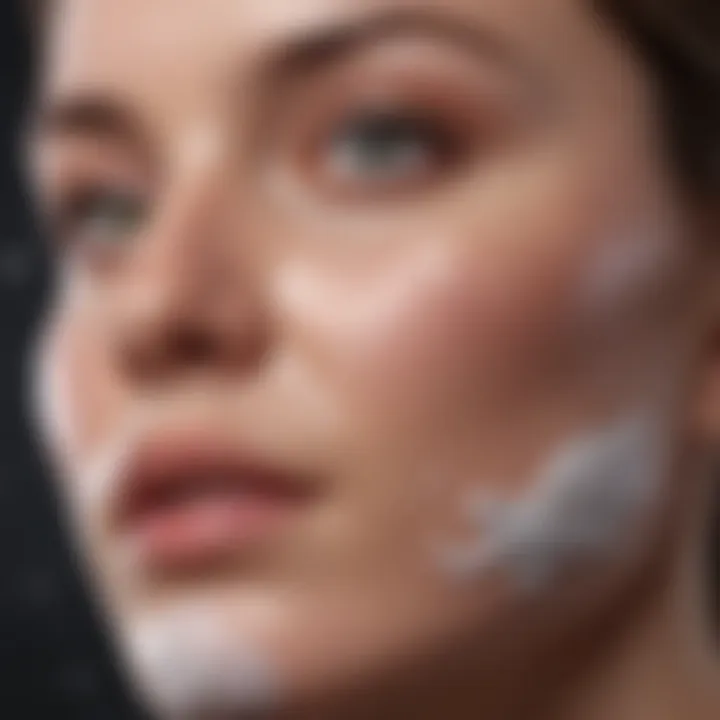Daily Face Wash: Combatting Blackheads Effectively


Intro
Managing blackheads is a common concern in skincare routines. Understanding their formation, causes, and solutions is crucial for achieving clear skin. Daily face washes play an instrumental role in this process. They help to cleanse the skin, remove excess oil, and clear clogged pores that often lead to blackhead formation. This comprehensive guide illuminates the importance of selecting the right face wash while also providing tailored recommendations to suit various skin types.
Blackheads occur when hair follicles become clogged with oil and dead skin cells. They are most commonly found on the face, particularly in areas such as the nose and forehead. Addressing blackheads requires a methodical approach, where routine cleaning and targeted ingredients come into play. In the sections ahead, we will explore effective daily face wash strategies, essential ingredients, and application methods.
This article is designed to equip readers with knowledge, instilling an understanding of their specific skin needs and the right products to meet them. With the right information, anyone can improve their skincare routine and combat blackheads adeptly.
Understanding Blackheads
Understanding blackheads is crucial in formulating an effective skincare routine and managing acne-prone skin. Blackheads, or open comedones, occur when hair follicles become clogged with excess oil and dead skin cells. This article delves into the key components of blackhead formation, helping readers demystify this common skin issue.
Definition and Characteristics
Blackheads are small, dark-colored bumps that form on the skin, particularly on the face, nose, and chin. Unlike whiteheads, they remain open at the surface, which exposes the clogged material to air. This exposure leads to oxidation, giving them their characteristic dark appearance. Blackheads are often mistaken for dirt, but the color is simply a result of this oxidation process. Understanding that blackheads are not dirt-related helps in adopting a more targeted approach to treatment.
Common Causes
Several factors contribute to the formation of blackheads. One major cause is excess oil production. Sebaceous glands in the skin can produce more oil than necessary, leading to clogged pores. Hormonal changes, such as those occurring during puberty or menstruation, can also increase oil production. Furthermore, improper skincare routines, including inadequate cleansing, can exacerbate the problem. Other factors such as diet, stress, and cosmetic products can further influence the likelihood of developing blackheads.
Skin Types Prone to Blackheads
Certain skin types are more susceptible to blackheads. Oily skin is the primary culprit, as the excess sebum can combine with dead skin cells, increasing the chances of clogged pores. Combination skin, which exhibits characteristics of both oily and dry skin, is also prone to blackheads, especially in the oilier areas. However, individuals with dry skin can develop blackheads if they use heavy moisturizers or fail to properly exfoliate. Understanding your skin type is essential for tailoring a skincare routine that minimizes the risk of blackhead development.
Importance of Daily Face Wash
Daily face wash serves as a cornerstone in any effective skincare regimen. It provides the necessary foundation for maintaining healthy and clear skin. Understanding its significance can lead to better skincare choices that actively contribute to blackhead prevention.
First, a daily face wash removes accumulated dirt, oil, and impurities from the skin's surface. When these elements are not properly cleaned, they can clog pores and lead to various skin issues, including blackheads. Hence, a thorough washing routine is vital to ensure pores remain unobstructed, reducing the likelihood of blackheads appearing.
Moreover, daily face wash supports the overall health of the skin. It helps to maintain the skin's natural balance, preventing it from becoming too oily or excessively dry. This balance is particularly crucial for individuals prone to blackheads, as both excess oil production and dryness can exacerbate the problem.
"Regular cleansing is essential for keeping skin clear and promoting a healthy complexion."
Additionally, incorporating face wash in one's routine supports the absorption of subsequent skincare products. If the skin is clean, it allows for better penetration of treatments, such as serums or moisturizers, thereby enhancing their effectiveness. This linkage is vital for creating a well-rounded skincare routine that yields visible results over time.
Ultimately, a consistent daily face wash assists in preventing blackhead formation and contributes significantly to skin health. It serves not just as a cleansing step but as a proactive measure for long-term skincare success. Understanding its role is crucial for anyone looking to effectively combat blackheads and improve their overall complexion.
Role in Skincare Routine
In the context of a skincare routine, a daily face wash must be the first step. This initial action lays the groundwork for the subsequent layers of skincare, ensuring that they are applied to a clean canvas. Proper cleansing facilitates the removal of any residual makeup or impurities from the day, establishing an optimal environment for products meant to treat skin concerns.
Without this initial step, following applications may prove ineffective. For instance, without cleansing, a powerful serum or moisturizer may not penetrate the skin effectively, limiting the results one can achieve. Furthermore, integrating a dedicated face wash into daily routines can also help build consistent habits. It serves as a reminder to prioritize skin health, particularly for those with busy lifestyles.
Impact on Blackhead Prevention
The primary objective of any daily cleansing routine is to mitigate the risk of developing blackheads. By washing the face with an appropriate cleanser, one actively reduces oil buildup that would otherwise lead to pore blockages. Ingredients in specific cleansers can play a significant role here. Components like salicylic acid are known for their ability to penetrate pores, dissolving the debris that contributes to blackhead formation.
Additionally, a consistent cleansing challenge darkens the space of blackhead formation. The more regularly one washes their face, the less likely it is that oils and dead skin cells accumulate and contribute to pore clogging. This practice becomes even more important within warm or humid climates, where skin tends to produce excess oils.
Thus, emphasizing the importance of daily face wash is key for anyone concerned about blackhead management. It acts as a first line of defense against the formation of blackheads and plays a vital role in maintaining clear skin.


Frequency of Use
Determining the frequency of face washing can vary for individuals based on their skin type and lifestyle. Generally, dermatologists recommend washing the face twice a day—once in the morning and once before bed. This routine helps eliminate the day's buildup of oils, dirt, and other pollutants.
For those with oily or acne-prone skin, a more frequent routine may be beneficial. However, for individuals with sensitive or dry skin, excessive washing can strip natural oils and cause irritation. In such cases, less frequent washing, perhaps just once or twice a day, might be advisable.
Choosing the Right Face Wash
Selecting the appropriate face wash is critical in managing blackheads effectively. The right cleanser not only cleans the skin’s surface but also penetrates pores to address issues that cause blackhead formation. It is essential to look for specific elements in a product, as they can determine the best outcomes for your skincare regimen. Factors such as skin type, ingredient efficacy, and formulation play significant roles in ensuring that the chosen face wash aligns with individual needs.
Key Ingredients to Look For
Salicylic Acid
Salicylic acid is a beta hydroxy acid known for its ability to penetrate oil-filled pores. This unique property makes it especially effective for blackhead treatment. It helps to dissolve the bonds that hold skin cells together within the pores, preventing clogged pores and promoting cell turnover. Salicylic acid provides an excellent way to smooth the skin's texture over time, making it a popular choice among users aiming to reduce blackheads.
Benzoyl Peroxide
Benzoyl peroxide is a well-known compound in acne treatment. It works by eliminating acne-causing bacteria on the skin surface and inside the pores. This ingredient is beneficial because it not only helps to treat existing blackheads but also prevents new ones from forming. However, benzoyl peroxide can be drying for some skin types, requiring users to find a balance in their routine.
Tea Tree Oil
Tea tree oil is celebrated for its natural antibacterial properties. This aspect makes it a favored ingredient among those seeking a more organic approach to skincare. It effectively helps in keeping breakouts at bay and can soothe inflammation. However, tea tree oil should be used with caution as it may cause irritation for sensitive skin types.
Glycolic Acid
Glycolic acid is an alpha hydroxy acid known for its exfoliating abilities. It works on the skin's surface to remove dead skin cells, thus reducing the chances of pore blockages that lead to blackheads. Known for being gentle yet effective, it improves overall skin tone and texture. Its microscopic size allows it to penetrate deeper layers of the skin, making it a versatile option for people wanting clearer skin.
Ingredients to Avoid
Harsh Sulfates
Harsh sulfates, such as sodium lauryl sulfate, are often found in many commercial cleansers. They serve as surfactants that create lather to remove dirt and oil. However, these ingredients can strip the skin of essential moisture and disrupt its natural barrier. Continued use can lead to dryness and irritation, counteracting the benefits you seek in a face wash.
Alcohol-based Formulas
Alcohol-based formulas are often marketed as quick-dry solutions for oily skin. They may provide a temporary feeling of cleanliness but can lead to longer-term dryness and irritation. Alcohol can destabilize the skin's barrier, leading to rebound oil production. Thus, while they may seem effective at first, the long-term consequences can exacerbate blackhead issues.
Fragrance Additives
Fragrance additives are included in many skincare products to enhance the user experience. However, they can be irritating to sensitive skin and can trigger allergic reactions in some users. Since blackheads often result from clogged pores and inflammation, it is wise to choose fragrance-free options to minimize adverse reactions.
Types of Face Wash Formulations
Foaming Cleansers
Foaming cleansers are popular for their ability to thoroughly cleanse the skin by creating a rich lather. Their refreshing feel can be appealing, especially for oily skin types. However, some foaming cleansers can be overly stripping and lead to dryness. Users should select formulations that contain beneficial ingredients to counteract this effect.
Gel-Based Washes
Gel-based washes deliver a lightweight cleansing experience. These products suit various skin types, especially oily or combination skin. They provide a refreshing feel and often include exfoliating components to tackle blackhead formation. Ensuring the formula does not contain harmful additives is important.
Cream Cleansers


Cream cleansers are best for dry or sensitive skin types. Their emollient-rich formulas help maintain moisture while cleansing the skin. Though they may not be as effective at dissolving excess oil, they can still assist in preventing blackhead development when combined with the right ingredients.
Considering Skin Sensitivity
When choosing a face wash, it’s vital to consider skin sensitivity. Many users have unique skin conditions that may react differently to various ingredients. This aspect adds another layer to choosing the correct product. Testing a small area of skin before full application can help gauge compatibility, reducing the risk of irritation or negative reactions. Understanding your unique skin profile aids in establishing a personalized skincare routine that effectively targets blackheads.
Applying Face Wash Effectively
Understanding how to apply face wash effectively is a critical part of any skincare routine, particularly when it comes to combating blackheads. The manner in which you cleanse can influence not only how well impurities are removed but also the overall health of your skin. By paying attention to pre-wash preparations, proper washing techniques, and effective rinsing and drying methods, you can maximize the benefits of your face wash and help prevent blackheads from forming.
Pre-Wash Preparations
Before you even reach for your face wash, preparatory steps are vital. First, it’s essential to ensure your hands are clean. Washing your hands removes dirt and bacteria that could be transferred to your face during application.
Next, pull back your hair. Using a hairband or clip can keep hair away from your face and prevent oils from your hair from contaminating the clean zones on your skin.
Additionally, you should assess the temperature of the water. Using lukewarm water opens your pores, making it easier for the face wash to do its job effectively. Avoid very hot or very cold water, as it can irritate the skin.
In sum, pre-wash preparations include:
- Washing hands thoroughly
- Pulling hair away from the face
- Choosing lukewarm water
Washing Technique
Once you have prepared, the washing technique is paramount. Applying the face wash correctly can significantly impact the results. Start by dampening your face with lukewarm water, applying just enough product to cover the fingertips.
Using your fingertips, gently massage the cleanser into your skin using circular, upward motions. Focus on areas where blackheads tend to appear, like the nose and chin. Be careful not to scrub aggressively; that can irritate the skin and prompt excessive oil production.
Time is also a consideration. Aim to spend at least 20 to 30 seconds working the product into your skin. This gives the active ingredients time to work effectively.
Rinsing and Drying
Finally, rinsing and drying your face should be done with care. Start by rinsing with lukewarm water to remove all traces of face wash from your skin. Make sure the water is not too hot or cold, as that can cause irritation or dryness.
Once rinsed, gently pat your face dry with a clean towel. Avoid rubbing your skin, as this can cause irritation and worsen any existing blackheads. Instead, gently press the towel to your face to dab off excess moisture, leaving your skin ready for subsequent skincare steps.
Supplementing Your Routine
In the pursuit of clear skin, a daily facial wash is essential, but it is only one facet of an effective skincare regimen. Supplementing your routine with targeted products can significantly enhance the results achieved from your face wash. Each additional product plays a role in maintaining skin health and preventing blackheads.
Daily use of complementary products ensures that the skin remains balanced, hydrated, and prepared to combat blackhead formation. The importance of establishing a routine goes beyond mere surface cleaning; it necessitates a holistic approach that integrates various elements beneficial for skin clarity and texture.
Toners and Exfoliants
Toners and exfoliants can bridge the gap between cleansing and moisturizing. A toner can help to remove any residual impurities or makeup left after washing. This prepares the skin for subsequent steps by ensuring that pores are as clean as possible. Look for toners with ingredients like witch hazel or rose water, as these can help balance oil production and minimize pores. Exfoliants, on the other hand, play a crucial role in preventing blackheads by removing dead skin cells that could otherwise contribute to clogged pores. Consider using products containing alpha-hydroxy acids (AHAs) or beta-hydroxy acids (BHAs) to achieve gentle yet effective exfoliation.
Moisturizers After Washing
After cleansing, the skin needs hydration. Moisturizers work to restore moisture and provide a protective barrier. Even if your skin tends to be oily, skipping moisturizer can lead the skin to produce even more oil in compensation. Select a non-comedogenic moisturizer that will not clog pores. Ingredients like hyaluronic acid or glycerin are excellent choices as they hydrate without adding excess oil. The right moisturizer can balance your skin and support the effectiveness of your washing routine.
Spot Treatments for Blackheads
For those particularly stubborn blackheads, spot treatments might be necessary. These treatments often contain ingredients such as benzoyl peroxide or salicylic acid, which target problem areas directly. Applying these treatments after your cleansing routine can help reduce inflammation and clear embedded dirt and oil. Applying them correctly involves using a small amount directly on affected areas, which can prevent further issues while allowing you to maintain the overall cleanliness of the rest of your face.


"Supplementing your skincare routine not only addresses blackheads more effectively but also ensures your skin feels balanced and healthy."
Utilizing these supplements can drastically improve the quality of your skincare routine. Incorporation of toners, moisturizers, and targeted treatments will not only complement your daily face wash but also help in maintaining skin clarity over time.
Evaluating Product Efficacy
Understanding how to evaluate the efficacy of a face wash dedicated to controlling blackheads is crucial for anyone seeking clear skin. This part of the article addresses the specific signs that indicate a product is effective, when it might be time to switch products, and the benefits of consulting with a dermatologist. Each of these elements can greatly shape your skincare routine and help ensure that it meets your needs.
Signs of Improvement
When using a new face wash, observing signs of improvement is essential. Initially, you may not see immediate results, but over time, effective products show several noticeable changes in the skin.
Some positive signs include:
- Reduction in blackhead appearance: A visible decrease in the size and number of blackheads can signal that your face wash is working.
- Smoother skin texture: A significant improvement in texture is often a result of effective exfoliation.
- Less oily skin: If you notice your skin feeling less greasy throughout the day, this is a positive effect of ingredients like salicylic acid.
- Decrease in breakouts: Consistent use should lead to fewer breakouts, which indicates better control over oil and bacteria.
These aspects can give you confidence that the product is having the desired effects. It's important to give the product enough time, typically four to six weeks, to evaluate its full impact.
When to Switch Products
Changing skincare products can be daunting. However, there are specific scenarios when it is advisable to switch your face wash. Consider a change if you experience:
- Persistent blackheads or breakouts despite regular use, signaling that the product may not be effective for your skin.
- Skin irritation: If you notice increased redness, burning, or peeling, the formulation may be too harsh.
- Lack of improvement: If there are no noticeable changes in your skin after a month or so, it might be time to try a different product.
- Skin type changes: Skin can evolve due to factors such as aging or seasonal changes, necessitating a different formulation.
Switching products should be done cautiously. Test new products on a small area to ensure compatibility before fully incorporating them into your routine.
Consulting a Dermatologist
Consulting a dermatologist can provide personalized guidance for managing blackheads and skin health overall. Professional advice is beneficial for several reasons:
- Tailored recommendations: A dermatologist can identify your specific skin type and recommend surface treatments or prescription products that align with your needs.
- Assessment of underlying issues: Sometimes, persistent blackheads point to other skin disorders. A professional evaluation can confirm or rule out these concerns.
- Advanced treatments: In cases where over-the-counter products don’t work, dermatologists can provide treatments like chemical peels or extractions to enhance your regimen.
Overall, evaluating product efficacy is a pivotal process in achieving optimal skincare outcomes. Staying attuned to your skin’s reactions and consulting with professionals when necessary will empower you to make informed decisions, driving you closer to effective blackhead management.
Finale
The conclusion serves a vital purpose in summarizing the essential insights shared throughout the article. It reinforces the message that a proper daily face wash is instrumental in the battle against blackheads. Emphasizing the significance of effective ingredients and regular application can clarify for the reader that consistent skincare can yield tangible results.
Summarizing Key Takeaways
Several key points emerge from the previous sections. Firstly, understanding blackheads and their causes is paramount. Recognizing that factors such as excess oil and clogged pores contribute to their formation aids in selecting appropriate products.
Secondly, the role of daily face wash cannot be overstated. It acts not only as a cleansing agent but as a preventive measure against blackhead reoccurrence. Choosing the right formulations, particularly those rich in salicylic acid or tea tree oil, can address issues effectively.
- Regular cleansing helps to:
- Remove impurities
- Minimize pore blockage
- Control excessive oil production
Additionally, the application techniques discussed earlier enhance product efficacy. Proper washing methods and follow-up skincare can greatly influence the overall health of the skin. Regular use of potent ingredients in the wash routine can lead to visible improvements.
Encouragement for a Consistent Routine
Finally, establishing a consistent skincare routine is essential for anyone struggling with blackheads. Progress may be gradual but sticking to a daily process fosters long-term skin health.
It is important to remember that changes in skin texture and reduced blackheads take time and diligence. Skincare is not a one-time effort; it requires a long-term commitment to see significant improvement. One should also remain open to adjusting their routine as skin conditions change or as new products become available.
"Consistency in skincare is key to achieving and maintaining results."
Ultimately, the journey to clearer skin is unique for everyone. However, with a tailored routine rooted in the key principles discussed, readers can empower themselves to address blackheads effectively and enhance their overall skin quality.







